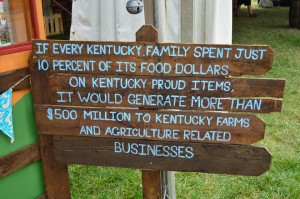I have no idea how accurate the sign is, but it got me intrigued to crunch the numbers. [PLEASE LET ME KNOW IF MY MATH DOESN’T ADD UP!!] Assuming that $500 million could be generated if Kentuckians spent 10% of their food dollars on Kentucky Proud products, that means that Kentuckians spend $5 billion each year on food. With roughly 4.4 million people living in the state of Kentucky, that means that every man, woman, and child in Kentucky spends roughly $1,140 on food each year. If each person were to allocate 10% of their food dollars to Kentucky producers, that would come out to $114 per person per year, or $9.50 per person per month. I don’t know about you, but that seems like a totally do-able amount of money to spend each month supporting local farmers, producers, restaurants, and farmers markets. In fact, it seems silly that folks can’t spend more than $10 per month on local food. It certainly will make me look at old Alexander Hamilton a little differently next time he peers up at me from my wallet.
I’m not trying to get super preachy here and say that everyone should make the same food choices as me, but I would challenge you to actively make your own food choices. What is important to you and your family when it comes to food? What kinds of food do you want to eat? Who produces the kind of food you want to eat? Where does that food come from? Your food dollars make a difference for the producers of that food, and it that way, your food dollars can directly support farmers and businesses in your community. But food dollars aren’t all that matters. I once heard someone say that every dollar you spend on food is like a vote, and while I understand the logic behind that idea, it makes me feel a little squirmy. It implies that the people with the most money have the most votes, and people with less money have fewer votes. There are so many things that you can do to support local food that don’t involve “voting” with your dollars. Sure, where you spend your food dollars makes a big difference, but you can also do things like grow some of your own food, whether it’s an expansive garden or just a few containers with basil on your balcony. You can cook more meals at home using local, seasonal ingredients. You can get to know your local food producers, ask them questions about their growing practices, and support them by spreading the word about their businesses. You can volunteer to help out on a farm or a community garden in exchange for food. You can donate fresh, locally grown food to a food pantry. You can support policies in your local government that protect agricultural lands and keep them available to farmers at affordable prices. You can simply just read a book or two about food. All of these activities will make a difference in how you eat, how you think about your food, how you choose to support food producers, and thus have a ripple effect through your food system.
- To look up Kentucky Proud producers, use the Find Kentucky Proud Producers Search Engine
- To find local producers in the Greater Cincinnati area, consult the Central Ohio River Valley (CORV) Local Food Guide. The guide not only lists local producers, but gives information on their growing practices.


